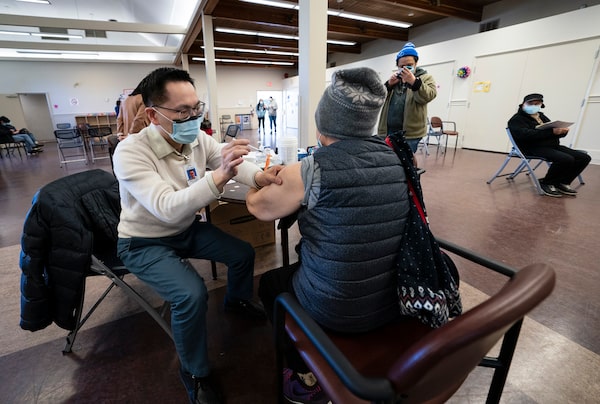
Dr. E. Kwok administers a COVID-19 vaccine to a recipient at a vaccination clinic run by Vancouver Coastal Health, in Richmond, B.C., on April 10, 2021.JONATHAN HAYWARD/The Canadian Press
British Columbia is prioritizing teachers and school staff working in COVID-19 hotspots for vaccination, even though newly presented data show transmissions are relatively low at schools.
At a news briefing Thursday, Provincial Health Officer Bonnie Henry said getting educators to the front of this line is wise because classroom exposure is so unsettling and disruptive to communities.
“It’s so important that we prioritize school staff for immunization starting with the areas with highest community transmission and we’ll be working through all school staff in the province in the coming weeks,” Dr. Henry said.
B.C.’s swelling COVID-19 cases fuelled by variants, travel
COVID-19 spike in B.C. could overwhelm B.C. hospitals, modelling group says
Canada vaccine tracker: How many COVID-19 doses have been administered so far?
Though high-schoolers are now slightly overrepresented among the overall number of cases (6.2 per cent), there have been no deaths of school-aged children in the province, she said. Dr. Henry added that fewer than one in 200 children with the virus have been hospitalized – a tenfold decrease of the rate among adults.
She says calls for school closures in some regions of the province would not make sense considering data showing so few cases are linked to those structured settings.
Unlike Ontario, which closed schools indefinitely to pivot to online learning this week, B.C. will keep its public classrooms open despite rising case counts and rampant variants of concern.
Across the Rockies, Alberta has not prioritized teachers for vaccines, instead pointing out that the education staff at the highest risk of severe outcomes – because of their age or underlying health conditions – are already eligible.
Earlier this week, the province approved a request from Calgary’s public and Catholic school boards to shift Grades 7 to 12 to online learning for two weeks beginning on Monday, citing a shortage of substitute teachers and high COVID-19 infection rates. As she explained that announcement, Education Minister Adriana LaGrange defended the province’s decision not to offer vaccines to teachers sooner.
“I absolutely have been advocating for teachers and all education staff to be vaccinated,” she said. “I am encouraging everyone – every teacher, every bus driver, every educational assistant, every receptionist, administrator, anyone within the education system – that when their turn comes up, that they certainly do go forward and get their vaccinations.”
Ms. LaGrange and Alberta Premier Jason Kenney have maintained that schools in the province are safe and that there has been limited transmission among students at school. Mr. Kenney blamed recent increases in infections among adolescent children, who currently have the second-highest per capita rates in the province, on socializing outside of schools.
The Alberta Teachers’ Association has repeatedly called for teachers and school staff to be given priority access to vaccines, which the union says will keep workers safe while making it easier to keep schools open. The large number of teachers who are off work isolating is among the reasons why in-person classes in Calgary have been cancelled.
As of Thursday, there were at least two cases of COVID-19 in 478 schools, or about 20 per cent of schools in Alberta.
That same day, B.C. released total case counts for school-aged children this school year to date (11,818), but did not give a tally of how many schools across the province have had at least two cases linked to transmissions in or near the classroom. The Fraser Health authority, home to the largest number of schools in the province, found roughly 15 per cent of schools in the region had links to likely infections on their grounds during the first nine weeks of this year, according a new study released Thursday by Dr. Henry.
The Fraser Health study and one from earlier in the school year by neighbouring Vancouver Coastal Health found that when the virus was spread at schools it led to an average of one or two other people in the school contracting it.
Terri Mooring, president of the BC Teachers’ Federation, said her union was happy to see these two studies at a provincial committee meeting on Tuesday, but the statistics from Vancouver Coastal, in particular, are meaningless now given the variants are so widespread on B.C.’s South Coast. She said the information from Fraser Health, which covers up to March 7, is “a little bit more relevant,” but more research is needed on how the variants of concern are now affecting the education system.
She added that it is unfortunate the province took so long before releasing these studies to the public, which could have helped assuage fears over classroom transmission much earlier. Ms. Mooring said her union - a harsh critic of Dr. Henry’s approach to mitigating the risk in schools - was told by the province the data was delayed as it underwent peer review.
“Kudos to Vancouver Coastal and the health authorities publishing data in medical magazines, but we need this information for the citizens of B.C.,” Ms. Mooring said.
Sign up for the Coronavirus Update newsletter to read the day’s essential coronavirus news, features and explainers written by Globe reporters and editors.
 Mike Hager
Mike Hager James Keller
James Keller